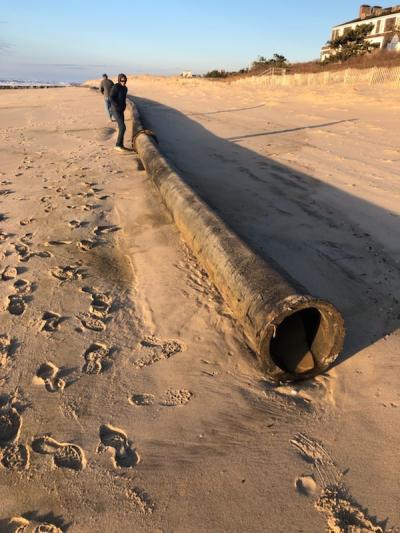Paul F. Rickenbach Jr. formally announced his resignation as East Hampton Village Mayor at the village board’s organizational meeting on July 3. His resignation will take effect on Dec. 31, more than six months before his term is to expire.
Mr. Rickenbach, who has held the office since 1992 and was formerly a member of the Village Police Department for 24 years, said he was honored to have served the village.
In early May, the mayor announced he would not seek re-election next year. “There comes that time when you say, hey, I’ve made my contribution and I want to leave on a high note,” he said, adding that he had been feeling “burned out.”
Paraphrasing a quote from Gen. Douglas MacArthur, he said on July 3, “Old mayors never die, they just fade away.”
After the mayor leaves office, the village board will have two options, said Becky Molinaro Hansen, the village administrator. It can appoint a new mayor by a majority vote, or it can leave the office vacant until an election is held next June. If the board chooses the latter path, Mr. Lawler, as deputy mayor, would assume the mayoral responsibilities, but not the title.
The board scheduled public hearings on July 31 for two proposed laws, one that would impose more severe fines for violations of village restrictions regarding animals on the beach, and one that would prohibit driving or parking a vehicle on the beach during the Fire Department’s annual fireworks display, this year on Aug. 17.
The latter proposal would merely eliminate the phrase “during the month of July” from the current code, since the fireworks display is now held in August.
Michael Bouker, the deputy superintendent of public works, will provide a report on the village’s stormwater management program at the July 31 meeting.
Animals are prohibited from being on any village beach from May 15 to Sept. 15, between the hours of 9 a.m. and 6 p.m. At all other times during those four months, the code states, dogs must be on a leash until they are 300 feet from the beach parking lot or end of the road.
Currently, for a first violation within 18 months, the penalty is a fine of not less than $100 nor more than $250, or by imprisonment for up to 15 days, or both. If the proposed law is enacted, the fines would be raised to a minimum of $150. An additional $75 penalty would be incurred by those who fail to contest the citation or to pay the fine within 15 days. Additional penalties for fines not paid within 60 or 90 days would be $150 and $200, respectively.
Chief of Police Michael Tracey recommended two changes to traffic and parking rules in the village. One was to prohibit left turns from Apaquogue Road onto Georgica Road when heading northeast. That intersection, said Chief Tracey, was not designed for turns, and drivers have a dangerously limited view of oncoming traffic.
His other suggestion was to prohibit commercial vehicles from parking at the end of Cove Hollow Road where it meets Georgica Cove. That area has become a popular parking spot, he said, for vendors and builders working in the neighborhood. The ban would protect the grassy area around the pond, and prevent it from being turned into a parking lot or rest stop.
The rest area off Montauk Highway at the entrance to the village drew the scorn of Mayor Rickenbach, who said it has been badly maintained by the state. He asked David Collins, the village’s new superintendent of public works, to prod the Department of Transportation, which oversees the road, to clean up the site.
The board approved a change order for additional work done by John Hummel and Associates to restore the historic Dominy woodworking and clock shops, which will be returned to their original location on North Main Street. A reconstruction of the Dominys’ timber-frame house will be erected between the shops and will serve as the main exhibition space.
In a letter to the board, Robert Hefner, the village’s director of historic services, said during excavation of the site, a natural gas line was found to be obstructing a drainage pipe, which had to be replaced.
Mr. Hefner said the plan to have a seven-foot-high cellar in the main exhibition space had to be scrapped when it was discovered that the water table was too high. Instead, a four-foot-high crawl space will be built, and a mechanical room intended for the cellar will be on the first floor.
In better news for the Dominy project, the board announced that Ronald S. Lauder, the billionaire chairman emeritus of the Estee Lauder cosmetics company, has pledged a donation of $250,000 to the restoration. The first installment of more than $83,000 was received by the village last month, and the rest will be donated in December and March 2020.

The children of Bertram and Shirley Farber also donated an old millstone, which had been at the Farber family home at 149 Main Street. It will be used as a step at the doorway of the Dominy woodworking shop. “My siblings and I are happy that this old stone we grew up with will have another life at the Dominy Shops museum,” wrote Alba Francesca, the executor of her parents’ estate, in a letter to Mr. Hefner.
Finally, the village plans to sell 50 feet of the dredge pipe that was found on Georgica Beach in January. The pipe will be sold by online auction or by sealed bid, for a minimum of $2,000.
